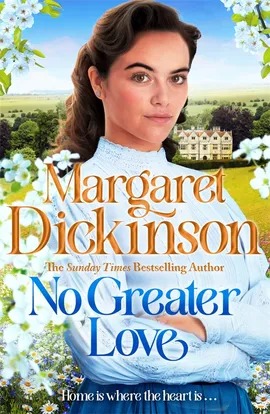search
date/time
 | Lancashire Times Weekend Edition |

Artis-Ann
Features Writer
12:00 AM 27th September 2025
arts
To The Manor Born: No Greater Love By Margaret Dickinson

Following a familiar theme, Margaret Dickinson’s novel sees the resilience of a young lady tested. Stronger than many who would have crumbled under the scandal and tragedies she endures, Lady Elizabeth Ingham is an example to young women everywhere.
The novel opens in 1901 when the Ancholme family is hit by a matchless scandal. The fifth Earl of Ancholme is unable to save his family from ruin, following the cavalier behaviour of his wastrel son, Bruce, who, it seems, has fallen in with ‘some very dangerous people’ whilst on his travels. His activities bring about the spectacular downfall of his family.
Reputation is everything and the Inghams quickly discover who their friends are and even where the hearts of their family lie. Elizabeth’s fiancé soon asks to be released from their betrothal and, further ostracised from society, the family finds there is only one way down the social ladder. Suddenly, Elizabeth has to find the strength and courage to make her own way in life and for a single woman of little means, in Victorian England, that is not easy. On the advice of the Bellinghams, the family solicitor and his wife, who never waiver in their support of the young Elizabeth, she trains to be a nanny – a far cry from the life for which she was originally destined – and she finds the necessary ‘courage and fortitude’ to forge her way in life. She comes to realise that not being shackled by the conventions of upper class society, and being free to make her own choices, she may just have had ‘a lucky escape’.
This isn’t,Mary Poppins, there is no magic nor dancing chimney sweeps even though Lizzie does occasionally seem to be too good to be true, but there is love and affection, sensitivity and a firm hand when necessary, which are clearly an effective tonic.
Her young charge is unruly and disruptive but it appears Charlie’s behaviour is the result of nurture not nature, the consequence of a succession of cruel nannies who did not believe in sparing the rod, but Lizzie has the calm patience to overcome the obstacles she faces. In doing so, she wins over the household, both above and below stairs. Lessons in how to deal with a disturbed child are clearly explained. This isn’t,Mary Poppins, there is no magic nor dancing chimney sweeps even though Lizzie does occasionally seem to be too good to be true, but there is love and affection, sensitivity and a firm hand when necessary, which are clearly an effective tonic. The reader shares Charlie’s development and celebrates his success, however small and tentative the steps may be.
The pace quickens but the details are not ignored as the reader hurtles towards the end. It could almost have been a novel in itself.
In the latter third of the novel, time passes quickly to sidestep a certain mundane quality in the narrative. The characters have been well-established and events take over. It seems it’s all over bar the shouting, the cake’s been made and just needs icing, the costume only lacks accessories and then it’s 1914. World War One with all its horror, takes centre stage. The final chapters follow the course of the war: the tragedies, the community spirit, the relief and the heartache. The pace quickens but the details are not ignored as the reader hurtles towards the end. It could almost have been a novel in itself.
No Greater Love is well-written and well-paced, with credible characters and a homely feel. Upstairs, Downstairs and Downton Abbey meet on the page, with perhaps even a nod, in the early chapters, to Bridgerton; a document of social history written with a light hand.
One thing which did hit home: Lizzie tells the local schoolmaster, “practical skills are just as valuable … as academic achievements. Everyone has a talent, it’s just a matter of finding out what that is and encouraging it”, and I say, "Hear hear!"
Also by Artis-Ann ...
Hidden Depths: The Troubled Deep By Rob ParkerSeeking Golden Nuggets: Hidden Fires By Sairish HussainA Kind Of Alchemy: The Secret Collector By Abigail Johnson‘I Write, I Act, I Change’: Alice Carver Manifests Her Perfect Life By Hannah LakeAn Open And Shut Case: A Time For Mercy By John Grisham